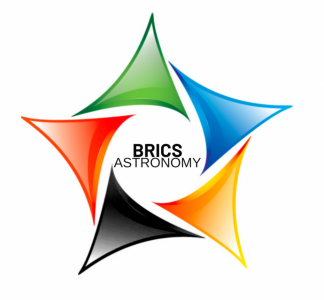
BRICS
BRICS is an association of five major emerging economies: Brazil, Russia, India, China, and South Africa. The BRICS members are known for their significant influence on regional affairs. The BRICS mechanism aims to promote peace, security, development, and cooperation. It also aims at contributing significantly to the development of humanity and establishing a more equitable and fair world.
The goal of BRICS Astronomy Consortium (BAC) is to exploit these basic strengths and common goals for the mutual betterment of our general populace.
Background
Astronomy is in the forefront of science and technology and has the potential to answer fundamental questions on the origins of the universe and humanity’s place in it. It transcends boundaries that divide people, and speaks to all society. Astronomy also is a key driver of innovation and an important catalyst for scientific and technical development as well as empowering human capacity for the knowledge-based economy of the future.
At the First BRICS Science, Technology and Innovation Ministerial Meeting held in Cape Town, the following five priority areas were endorsed, to be led by the respective BRICS member countries:
(a) Prevention and mitigating of natural disasters – ![]() Brazil
Brazil
(b) Water resources and pollution treatment – ![]() Russia
Russia
(c) Geospatial technology and its applications – ![]() India
India
(d) New and renewable energy, and energy efficiency – ![]() China
China
(e) Astronomy – ![]() South Africa
South Africa
BRICS Astronomy
During the Second BRICS STI Ministerial Meeting in March 2015 in Brazil, the BRICS member countries signed a Memorandum of Understanding (MoU) on STI cooperation. This MoU makes provision for three governing structures: the BRICS STI Ministerial Meeting; the BRICS STI Senior Officials Meeting; and the BRICS STI Working Groups. The latter are responsible for promoting cooperation activities in the designated priority areas, which should be convened at least once a year.
At the Third BRICS STI Ministerial meeting held in October 2015 in Moscow, the Work Plan was adopted and it was agreed that South Africa would host the First BRICS Astronomy Working Group Meeting during the first two weeks of December 2015 in Cape Town.
In terms of establishing the BRICS astronomy working group, South Africa will broadly follow the same format being used by other BRICS member countries that lead working groups and host BRICS STI workshops. Following this inaugural workshop, other BRICS astronomy workshops will be convened on an annual basis in South Africa (or elsewhere if so agreed).
The initial BRICS astronomy meeting (in December 2015) comprised a BRICS Astronomy Workshop and the inaugural meeting of the BRICS Astronomy Working Group, as well as site visits to the Square Kilometer Array and the Southern African Large Telescope.
The BRICS Astronomy Workshop provides a platform for BRICS member countries to engage on policy issues and other matters related to research, development and practice in astronomy, and to explore mechanisms for promoting BRICS cooperation in astronomy. The spectrum of scientific issues to be discussed may include: observational, theoretical and computational studies of the Sun and space weather, exoplanets, stellar astrophysics and asteroseismology, star formation, evolution of stars, the interstellar medium and astro-chemistry, galactic chemical evolution, transient phenomena, pulsars, neutral hydrogen in galaxies, active galactic nuclei and high-redshift galaxies, time-resolved astronomy and galaxy evolution.
The BRICS Astronomy Working Group is composed of government officials (or their designated representatives) supported by the focal points on astronomy and experts from BRICS member countries.
Mission of the BRICS Astronomy Working Group
The mission of the BRICS Astronomy Working Group is to promote cooperation between BRICS member countries in the field of astronomy and enabling technologies through joint activities of government, universities, research institutions, and industry, as relevant, to develop astronomical sciences, generate new knowledge, train human capital, develop new technologies and applications, and improve public understanding of science.
Cooperation Activities
The formation and implementation of cooperation activities follows the principles of voluntarism and openness, and each party will participate at their own cost unless alternative sources of funding can be identified.
Secretariat
The Department of Science and Innovation (DSI) of South Africa acts as the Secretariat to the Astronomy Working Group, and is responsible for:
- Dissemination of information to the Astronomy Working Group using various media, including a website;
- Organising annual meetings (providing a venue and meeting facilities, meeting agendas and relevant documents, coordinating experts,);
- Capture and maintaining proceedings of the Working Group;
-
Mission of the BRICS Astronomy Working Group
-
The mission of the BRICS Astronomy Working Group is to promote cooperation between BRICS member countries in the field of astronomy and enabling technologies through joint activities of government, universities, research institutions, and industry, as relevant, to develop astronomical sciences, generate new knowledge, train human capital, develop new technologies and applications, and improve public understanding of science.
